Sweet and Tangy Tartar Sauce
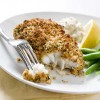
This sauce can be refrigerated in an airtight container for up to 1 week.

This sauce can be refrigerated in an airtight container for up to 1 week.
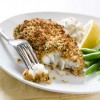
The golden brown coating and moist, flaky flesh of batter-fried fish come at a price: the oil. Cooks have turned to the oven to avoid the bother of deep-fat frying, but oven-frying often falls short. The coating never gets very crisp and the fish usually ends up overcooked. We aimed to put the crunch back into oven-frying.

Our teriyaki-inspired glaze complemented the fatty salmon and stuck to the fish thanks to a little cornstarch, which we sprinkled, along with brown sugar and salt, onto the exterior of the glazed salmon.
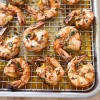
To ensure that the shrimp would brown before cooking through, we used the largest shrimp we could find. Leaving their shells on as we roasted them provided a barrier between the meat and the heat, which prevented the surface of the meat from shriveling. Further research revealed that the shells are also loaded with sugars, proteins, and other flavor-boosting compounds that amplified the rich seafood flavor. To make deveining and (later) peeling the shrimp easier, we used a pair of kitchen shears to split their shells from end to end without removing them from the flesh.
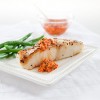
Pan-roasted fish seems like a simple dish, but in reality it is usually only well executed by practiced chefs. At home, the dish often results in dry, overbaked fillets. We set out to develop a foolproof recipe for producing succulent, well-browned fillets. From an initial round of testing, we knew we needed thick fillets; skinnier pieces end up overcooked by the time they’ve achieved a serious sear. We then turned to a common restaurant method to cook the fish: Sear the fillet in a hot pan, flip, then transfer it to a hot oven to finish cooking.

Brrr, there's nothing like slurping up a large steamy bowl of soup when it's cold out. I roasted carrots for the soup and added in shallots, garlic ginger paste, warm spices (coriander, cumin, and cayenne), chicken stock, and some pumpkin puree to give the soup body and add another layer of flavor. A little honey and sherry vinegar for sweetness and acid, respectively, rounded the flavors out. I also made it a full meal by piling a bunch of grilled shrimp into each bowl for some extra protein.

This sauce/side dish — a simple combination of fennel, tomatoes and olives — is magical. Not because it’s the best thing you ever ate, but because it’s transportive: you eat it and you’re in the Mediterranean. This is even true with winter tomatoes (though of course it’s better with those of summer, and see my suggestion below), because the dominant flavors are fennel and olives.

Most of our local white fish can’t take the heat of a grill, and while it’s good sauteed, it’s even better dusted with crisp panko breadcrumbs. For this oven-fried fish and chips, use haddock (also splendid when it’s deep-fat fried in the restaurant version of the dish), or hake, halibut, or cod. Brush pieces of fish with oil, press on the crumbs, and let it cook, first in the oven, then briefly under the broiler, until golden. Tuck golden potato wedges beside the fish, and dig into a New England classic.

Of all the ways to prepare shrimp, the grill delivers the best flavor. Although unadorned "shrimp on the barbie" are great, an easily assembled gingery barbecue sauce makes them that much better. You can save time by buying already shelled and deveined shrimp, but our recipe developer, Alexis Touchet, who grew up in shrimp country in southwest Louisiana, thinks shell-on shrimp are better quality. Depending on where you live and what's in your market, you may not have much choice. Freshness trumps all, so don't hesitate to use your nose in deciding which shrimp to buy.
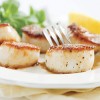
Producing, crisp-crusted restaurant-style scallops means overcoming two obstacles: chemically treated scallops and weak stovetops. We wanted to achieve superior pan-seared scallops that had a perfectly brown crust and no hint of off-flavors.